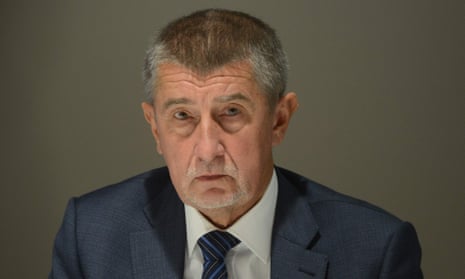Czech Republic is poised to join Europe’s lurch towards anti-establishment populism by electing as its prime minister a controversial billionaire who faces criminal fraud charges and accusations of communist-era secret police links.
Andrej Babiš, 63, whose estimated $4.1bn (£3.1bn) fortune makes him the country’s second-richest man, could become the latest politician to drive a wedge between the continent’s east and west if he wins the parliamentary election this week.
Opinion polls suggest the tycoon’s party, ANO (yes), will emerge as the biggest force after voters go to the polls on Friday and Saturday for an election held over two days, a legacy from communist times.
That would put Slovakian-born Babiš in pole position to become prime minister heading a coalition, despite question marks over his past and warnings that he could threaten Czech democracy through his business empire.
It also raises the prospect of Czech Republic joining neighbouring Hungary and Poland in being in conflict with the EU over alleged democratic violations. Prague is already at odds with Brussels for refusing to accept relocated migrants, triggering EU infringement proceedings.
At the heart of Babiš’s message is a pledge to “run the state like a business”, a concept he has suggested could be furthered by halving the number of MPs in the Czech chamber of deputies to 100 and abolishing the upper chamber.
Despite ANO’s official positioning as a centrist, liberal, pro-EU party promoting greater “efficiency”, Babiš has championed popular Czech concerns over Europe’s migration crisis, giving a series of hardline speeches against immigration in provincial areas, where anti-foreigner feelings often run high.
With the current coalition leaders, the Social Democratic party (ČSSD), pledging not to serve in his government, Babiš may have to turn to fringe parties hostile to the EU and immigration.
The election comes less than two weeks after Czech investigators charged Babiš, who entered politics in 2011 styling himself as an anti-corruption crusader, with fraud over nearly €2m (£1.8m) in EU funds given to a luxury hotel and conference complex, Čapí Hnízdo (Stork’s Nest), deep in the Bohemian countryside, 33 miles (40km) south of Prague.
The money was intended to aid small businesses. But investigators allege that it was obtained illegally because the complex belonged to Babiš’s vast Agrofert conglomerate, which is made up of about 230 companies and employs 32,000 people, and should therefore not have qualified.
Olaf, the European commission’s anti-fraud unit, is also examining the case, which Babiš has dismissed as politically motivated.
Forming a governing coalition could enable Babiš to dodge the Czech prosecution by restoring his parliamentary immunity, which MPs voted to lift last month. The Czech president, Miloš Zeman, a close ally, could also issue a pardon, which Babiš would be constitutionally required to sign if he were prime minister.
More worrying, critics say, is the concentration of power that Babiš would secure. In 2014, when he was finance minister in the outgoing government, Babiš acquired two of Czech Republic’s leading newspapers.
Lenka Zlámalová, a commentator at Echo 24, who has investigated Babiš’s business interests, said: “If you combine media power, economic power and security power, the threat is clear.
“If he takes responsibility for the intelligence services and control of the tax authority, it will be really dangerous. He can use it against his competitors.
“His company is the biggest receiver of state and EU funds in Czech Republic. He receives about £1m more in subsidies a year than he pays in taxes. It’s really dangerous to combine politics and business in this way. Imagine if Theresa May was the biggest receiver of state or EU money in Britain.”
Babiš, the son of a senior Communist party official, has attempted to sidestep the issue by putting Agrofert, holdings of which include fertiliser, chemical and food companies, as well as fertility clinics, into a trust company.
Other questions have been raised about his activities under communism in what was Czechoslovakia. According to files in state archives, he was recruited as an agent by the secret police, the ŠtB. A dozen files suggest he operated under the codename Bures while in his official capacity as an employee of a state trading company, which allowed him to travel abroad.
Slovakia’s constitutional court reopened the issue last week by overturning a lower court’s 2014 ruling that had effectively cleared him.
Babiš had promised to challenge the latest verdict and argued that the secret police files identifying him were falsified and he cooperated only under duress, an explanation dismissed by experts as bogus.
Radek Schovánek, a Czech defence ministry specialist on communist-era files and documents, said: “There were strict internal ŠtB rules on the treatment of files [on] secret collaborators.
“They were authenticated and could not be falsified. Babiš was not forced into anything. He was a member of the Communist nomenklatura – the son of a nomenklatura – and his secret police file is typical of hundreds of such people.”
Of more current concern is the challenge Babiš represents to democracy in eastern and central Europe.
Pavel Šafr, the director of the Forum24 news website, said ANO’s lack of overt ideology presented a more complex challenge than the authoritarian governments of Viktor Orbán in Hungary and Jarosław Kaczyński’s Law and Justice party in Poland.
“Orbán is a conservative nationalist with authoritarian attitudes and Kaczyński is a hyper-conservative, Catholic orthodox politician, but they are both within the known European tradition,” he said.
“Babiš is not. He isn’t conservative, liberal or communist. He is Babiš, a universal populist. And that’s what makes him not understandable for Europeans.”










